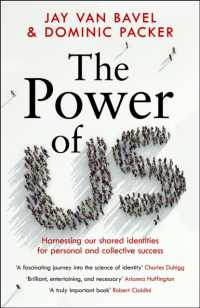- ホーム
- > 洋書
- > ドイツ書
- > Social Sciences, Jurisprudence & Economy
- > Education Science / Pedagogic
- > guide books for education
基本説明
Presents a comparative analysis of the dilemmas faced by working parents with young children in four European contries - France, Italy, Ireland and Denmark - each of which represents a different "experience" of the evolving gender role process.
Full Description
At the risk of sounding frivolous, there is a good case to be made for the argument that women constitute the revolutionary force behind contemporary social and economic transformation.








